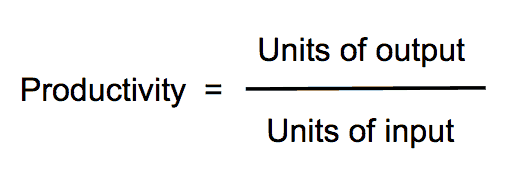
What has happened to the UK’s productivity? Does it matter? After all, if businesses are ticking along, isn’t that good enough?
The UK has fallen behind other similar economies. Not so long ago, Chancellor Philip Hammond said, “It takes a German worker four days to produce what we make in five, which means, in turn, that too many British workers work longer hours for lower pay than their counterparts. “
Less pay matters to employees. Less consumer spending matters to the economy.
So, what is behind the UK’s relatively low productivity rate? This article addresses the productivity puzzle, looking at the problems why productivity matters.
What is productivity?
ivity is an economic term and refers to the measurement of output per unit of input. It measures capital and resources, but most commonly focuses on labor. Labor productivity is the amount of work produced by a worker, related to hours worked. It measures the efficiency of a person by converting input into output. It is calculated by measuring the number of units produced relative to the number of hours an employee works.

ivity growth defines how much, in terms of goods and services, is consumed across the UK. Since the second World War productivity grew steadily and by 2015 British workers produced as much in 1 hour as 5 of their counterparts one hundred years before.
What exactly is the UK productivity puzzle?
According to research around business culture carried out by HR software business, Breathe HR, 75 per cent of SMEs are satisfied with business productivity.
Only 6 per cent of the survey population were found to be dissatisfied. This is a puzzle in itself, since productivity in the UK has slumped since the financial crisis in 2008.
Britain’s workers in fact have to spend longer working to generate the same value of goods and services than their equivalent in the US or Germany.
Chris Giles, economics editor at the FT, considers why UK workers are so unproductive.
Giles explains, the sudden stagnation of productivity growth following the financial crisis of 2008/9 is known as the productivity puzzle. There has been very little growth in the UK’s productivity since 2008. Workers today produce the same amount in 1 hour as a worker in a similar field 10 years ago.
While other countries around the world also suffered a slowing down of productivity following the global financial crisis, austerity has slammed on the breaks in Britain. In addition, the UK has a large proportion of low productivity companies, as compared to other similar economies such as Germany and France.
Poor performing companies have been able to avoid going to the wall as a result of low interest rates and the availability of credit.
Giles points to the fact that the UK’s superstar companies, that are at the cutting-edge of technological advancement, are also underperforming.
The fact is, the strongest companies in the UK aren’t performing as well as they were. Brexit, economic uncertainty and a lack of investment in business and in education are taking their toll.
Why does the productivity puzzle need to be solved?
According to research by the University of Cambridge on how to solve the UK’s productivity puzzle, many areas of the UK are just as poor as swathes of Eastern Europe.
There is a huge disparity between different regions of the UK, with the South East and a handful of other major cities sitting at the top of the pile. There is an increasing productivity gap between a few prosperous zones in the UK and the rest of Britain.
ivity is the fuel of our economy. In a CEO summit in 2016, Terry Scuoler, industrialist and supporter of UK manufacturing and engineering, said on why productivity is so important,
“ivity performance is a key driver of long-term economic growth and prosperity. It is also a shared agenda with the government, employers and employees, who all benefit if it can be improved.
“The government benefits from better economic performance and higher tax receipts. Businesses benefit from growth, enhanced competitiveness, profitability and market share. Employees benefit from higher-wage growth, employment opportunities and career prospects. “
How?
There are two sides to the productivity coin; businesses themselves and government. Scuoler explains, “While business is the driver of productivity growth, government must also be seen as an enabler. Its policy sets the macroeconomic parameters that affect the ability of businesses to reach their productive potential. “
Government needs to up its game and commit to a forward-thinking industrial and technological strategy. There needs to be a focus on long-term investment, especially around infrastructure and education.
In addition, businesses need to be ambitious about growth and invest in an organizational culture that gives employees flexibility and the opportunity to progress and learn new skills. Employees, given the right tools, can lead a company in innovation. Put all of this together and the UK has every chance of reaching the dizzy heights of pre-2008 productivity growth once more.
Visit this site for more project management software tools.





